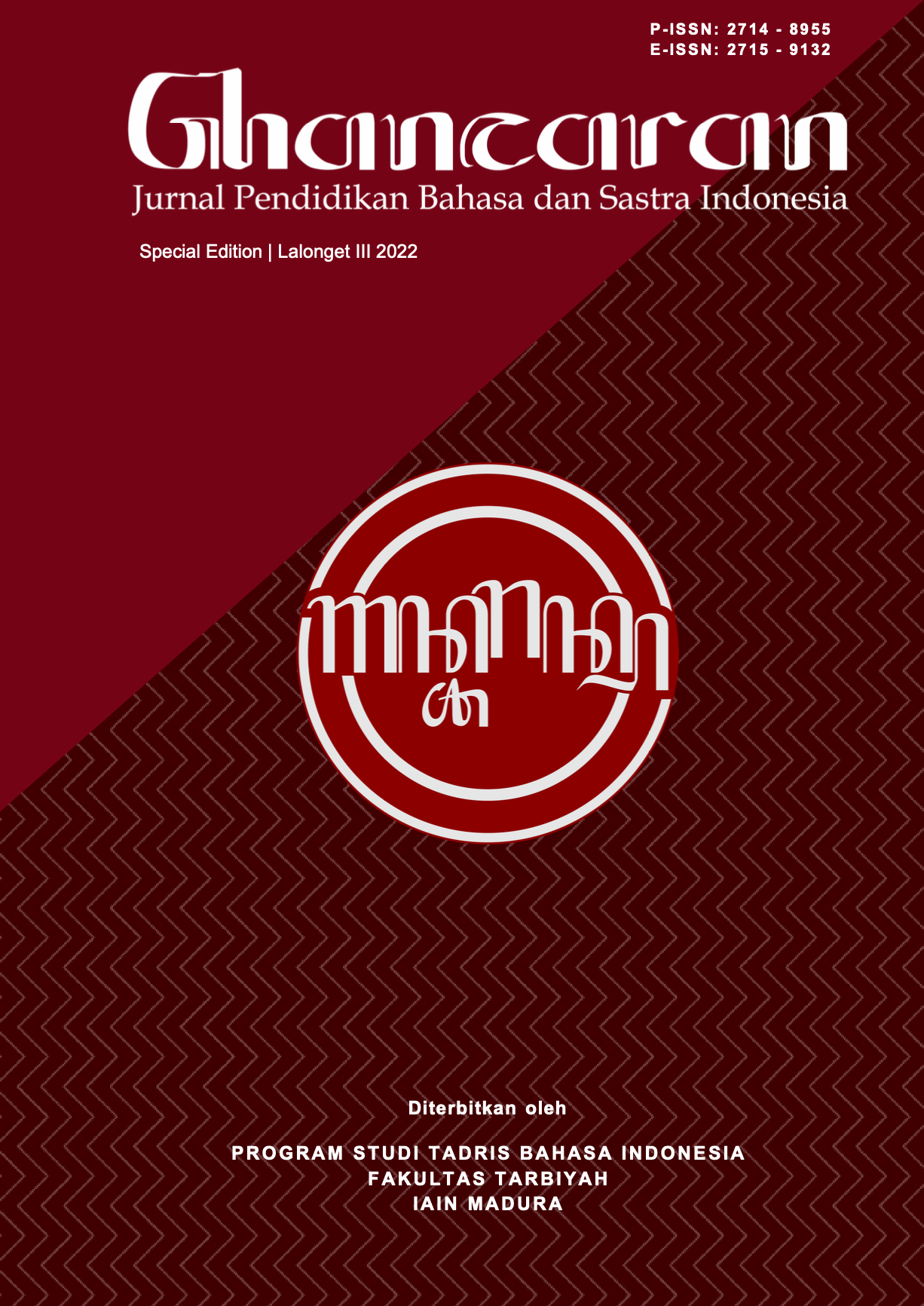Nilai Pendidikan Akhlak dalam Novel Pudarnya Pesona Cleopatra Karya Habiburrahman El-Shirazy (Pembelajaran Sastra di Era Merdeka Belajar)
 Abstract views: 224
,
Abstract views: 224
,
 PDF downloads: 312
PDF downloads: 312
Abstract
This study aims to describe the value of moral education in the novel Pudarnya Pesona Cleopatra by Habiburrahman El-Shirazy (litteratur learning in era merdeka belajar). This research uses a qualitative research type of library research (library research) to get a description in the form of clear words. The method used is descriptive analysis to analyze, identify and examine the novel Pudarnya Pesona Cleopatra by Habiburrahman El-Shirazy related to moral education. The source of this research is the novel Pudarnya Pesona Cleopatra by Habiburrahman El-Shirazy. The data collection technique of this research uses documentation taken from the novel. The data analysis technique uses content analysis, namely by carefully identifying the data that contains elements of moral education, then linking it with the appropriate theory. The results of the study indicate that there are values of moral education in the novel Pudarnya Pesona Cleopatra by Habiburrahman El-Shirazy: (1) The value of moral education to God in the novel includes: Dhikr, which is remembering Allah by mentioning Him in the worst situations and conditions, Praying is asking for God in order to get His goodness and pleasure and Worship is doing all bodily obedience only because of Allah, (2) The value of moral education to fellow humans in the novel includes: Birrul Walidain, namely having character to parents by being devoted to him by obeying and loving him other than that morals to humans also maintain friendship with others and Itsar, namely prioritizing the interests of others over personal interests, (3) The value of moral education to oneself in the novel includes: Trust is something that is entrusted to others in the form of messages carried out well, Patience with exams and trials given o by Allah with grace and fortitude, and maintain self-respect by covering the nakedness and lowering the gaze of the opposite sex who is not a mahram.
Downloads
References
Abidin, Z. dan F. K. (2017). Penafsiran Ayat-Ayat Amanah Dalam Al-Quran. Syahadah, V.
Al-Arabiya, M. M. A.-L. (n.d.). Mu’jam Alfaz Al-Quran Al-Karim.
Al-Jalyat, S. T. (2004). Akhlak Dalam Perspektif Islam.
Al-Jauziyah, I. Q. (1998). Madarijus Salikin.
Al-Jauziyah, I. Q. (2008). Kiat Membersihkan Hati Dari Kotoran Maksiat Terj. Fauzi Bahreisy.
Al-Khani, A. (2003). Mukhtasar Al-Bidayah Wa An-Nihayah.
Al-Qarni, ’Aidh. (2004). La Tahzan “Jangan Bersedih.”
Al-Sanusi, A. A. M. bin Y. (1971). Terjemah Matan Tauhid Aqidah Sanusiyah.
Alu Syaikh, S. A. H. (2003). Fathul Majid di Terj. Syaikh Abdul Aziz Abdullah bin Baz.
An-Nawawi, A. Z. Y. bin S. (1997). Terjemah Riyadus Sholihin.
An-Nawawi, I. (n.d.). Syarah Shahih Muslim.
Ash-Shidieqy, T. H. (1991). Kuliah Ibadah.
Astuti, H. (2021). Berbakti Kepada Orang tua dalam Ungkapan Hadis. Riset Agama, 1.
At-Tabani, S. M. N. (2007). Tafsir Ibnu Katsir.
Bukhori. (2014). Nilai-Nilai Pendidikan Amanah dalam Al-Quran. Madania, 4.
Darmiah. (n.d.). Akhlak Anak Terhadap Orang Tua.
Dkk, W. R. (2020). Perspektif Sayyid Qutb Tentang Isu Penjagaan Pandangan Berdasarkan Ayat 30-31 Surah An-Nur. Pengajian Islam, 13.
El-Shirazy, H. (2007). Pudarnya Pesona Cleopatra.
Gunawan, H. (2014). Keajaiban Berbakti Kepada Orang Tua.
Hamdi, S. dan K. M. (2020). Menghadirkan Konsep Hifz Al-Irdi Dalam Bermedia Sosial: Upaya Menyikapi Asusila Abu-Abu di Youtube. El-Madani, 1.
Hamka. (1939). Tasawuf Modern.
Hasnahwati. (2021). Urgensi Pendidikan Sosisal Anak Dalam Prespektif Islam. Andi Djemma, 4.
Ihsan, M. (2017). Cahaya Kegelapan Terj. Nur Adzolam Syarah Aqidatul Awam.
Kholil, I. A. (2021). Catatan Dari Tarim.
Lulu Khumairoh, D. (2020). Makna Pesan Dakwah dan Komunikasi. LENTERA, XX.
MA, F. H. (2016). Konsep Altruisme Dalam Prespektif Ajaran Agama Islam. Psikoislamika, 13.
Muhammad, A. bin. (2018). Lubaabut Tafsir Min Ibnu Katsir.
Mursalim. (2011). Doa Dalam Perspektif Al-Quran. Al-Ulum, 11.
Nst, K. (2017). Konsep Keutamaan Akhlak Versi Al-Ghazali. HIJRI, 6.
Nurodin, D. (2018). Sportivitas dan Akhlak. Al-Mujaddid, 1.
Sagir, A. (2014). Pertemuan Sabar dan Syukur. Studia Insania, 2.
Said, M. (1986). Hadits Tentang Budi Luhur.
Shalih, S. M. bin. (1994). Buku Induk Akidah Islam : Syarah Aqidah Wasathiyah.
Subandi. (2011). Sabar: Sebuah Konsep Psikologi. Psikologi, 20.
Sukino. (2011). Konsep Sabar Dalam Al-Quran dan Kontekstualisasinya Dalam Tujuan Hidup Manusia Melalui Pendidikan. Ruhama, 1.
Syarbini, A. (2012). Ibadah Super Ajaib.
Wahab, S. M. B. A. (2005). Kitab Tauhid Terj. M. Yusuf Harun.
Copyright (c) 2022 GHANCARAN: Jurnal Pendidikan Bahasa dan Sastra Indonesia

This work is licensed under a Creative Commons Attribution-ShareAlike 4.0 International License.
Ghancaran: Jurnal Pendidikan Bahasa dan Sastra Indonesia uses an Open Access Policy under the Creative Commons Attribution-ShareAlike 4.0 International License. Authors publishing in this journal agree to the following terms:
- Ghancaran Journal holds the copyright and grants the journal rights for first publication with the work simultaneously licensed under a

The work is distributed under Creative Commons Attribution-ShareAlike 4.0 International License which allows others to share, copy, and redistribute the material in any media or format and adapt, remix, change, and develop the material even for commercial purposes, as long as it is stated credit and license derivative works under similar terms. - Authors may make additional contractual arrangements for non-exclusive distribution of the journal's published work version.
- Authors are permitted to post their work online (e.g., in institutional repositories or on their websites) before and during submission, as doing so may lead to productive exchange.



















